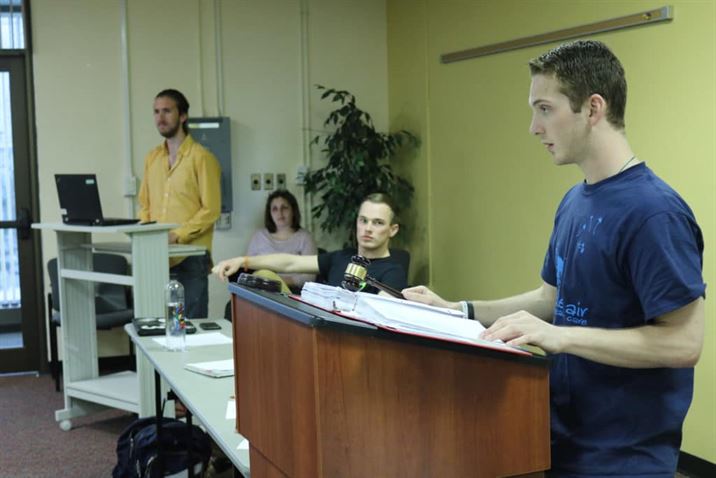
Interim President the Legislature, Brian Dolan (right), hears a motion to allow Legislator Matthew Kelly to write create a survey for controversial Israeli boycott bill.
Photo credit: Gabe Wanissian
A survey pertaining to an upcoming controversial bill calling for the Student Government Association (SGA) to endorse boycotting Israel will be sent out to undergraduates by Monday.
The pro-Palestinian BDS (Boycott, Divestment and Sanctions) bill was written by SGA Legislator Matthew Kelly, citing the United Nations report published in March that declared Israel an apartheid state due to its treatment of Palestinians in the region.
The report has since been rescinded by U.N. Secretary-General António Guterres for being “too harsh,” but the U.N. Security Council still maintains criticism toward Israeli Prime Minister Benjamin Netanyahu’s settlement constructions in Palestinian territory.
“We aren’t talking about being against Israeli people, we are talking about being against the oppressive government,” said Kelly, who came out in favor of BDS.
The BDS Movement seeks to accomplish its stated goal of “ending [Israel’s] occupation of the people of Palestine” by campaigning for boycotts, divestment and sanctions against Israel. The initiative has caught traction on numerous campuses in the United States and both Israeli and Arab leaders have criticized the movement.
The survey will be put together with SGA President Matthew Lerman to ensure a lack of bias on the complicated topic, and to get the student population’s take on the matter.
Kelly’s bill in question came under fire by Hillel, a Jewish campus organization which is part of the SGA, during a student affairs meeting on Monday. Hillel raised concerns that embracing the BDS Movement would be detrimental on both the Palestinian and Israeli fronts.
“Israel is a core component of who we are as culture, and to condemn it entirely is a threat to us and may encourage anti-semitism on campus,” said Hillel President Marissa London.
Bill discussion quickly evaporated and a debate over the very nature of the Israeli-Palestinian conflict became the major topic at hand, with interim Chair of Student Affairs Chris Langill frequently intervening to keep talks productive.
The decades-long Israeli-Palestinian conflict has mainly focused on the bloody dispute over land occupation, the rise of Netanyahu’s far right politics in the region and terrorist groups such as Hamas further adding turmoil to a battle that seemingly has no end in sight. 1,211 Israelis and 9,466 Palestinians have died since 2000, according to the U.N. Humanitarian Overview Report, and peace talks between the two sides ceased in 2014.
Both Netanyahu’s actions toward occupying the West Bank and Gaza and the anti-semitism pushed by Hamas have received harsh criticism at an international level. Recent polls from the Jerusalem Post show the country preferring the moderate Yesh Atid chairman Yair Lapid to replace Netanyahu in the upcoming election.
“Netanyahu does not reflect the Jewish values. He has failed in some steps to aid [Israeli and Palestinian] people,” said Hillel Treasurer Elaim Chang.
Kelly said, “there are definitely organizations in Israel that are well-meaning. Again, I don’t want to say that the people themselves are bad.”
The actions brought back a consistent ideological question of Montclair State’s SGA as to when they should be apolitical, and when they should take an outright stance.
The SGA operates as an independent, tax-exempt non-profit group, known as a “501(c)(3)” organization, after the relevant section of the U.S. Internal Revenue Code. Such organizations are prohibited by law from engaging in political lobbying and election campaign activities. But there is no prohibition on them or individuals associated with them expressing opinions on any matter.



